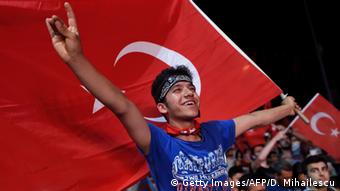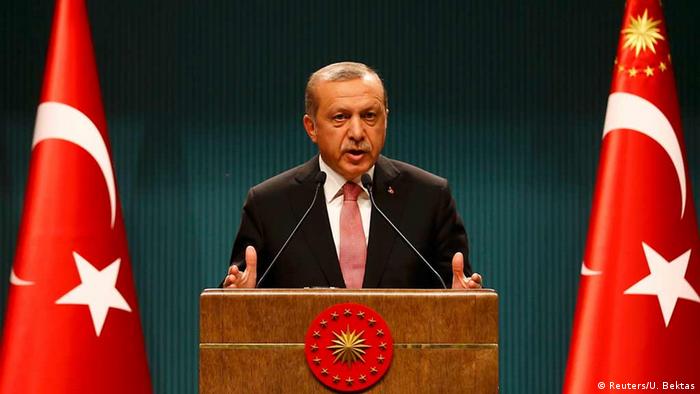EU foreign policy chief calls on Turkey to respect human rights
EU foreign policy head Federica Mogherini has urged Turkey not to use democratic institutions to undercut human rights. President Erdogan has moved fast in the wake of last week’s botched coup to consolidate power.
“We are making it very clear to our Turkish friends – we are fully behind the institutions, the democratic institutions, the legitimate institutions,” Mogherini (pictured above) said on Thursday evening.
“But there is no excuse, there is no way in which the reaction can undermine fundamental freedoms and rights,” she continued, adding that “what we’re seeing, especially in the fields of universities,media, the judiciary, is unacceptable.”
Turkey on Thursday imposed a three-month state of emergency, reinforcing state powers to round up suspects and suspending a key European rights convention.
President Recep Tayyip Erdogan said the emergency law would allow Turkey to be cleared of “terrorists” linked to US-based Muslim preacher Fethullah Gulen, whom he accuses of preparing the failed coup from the US.
Ankara has stepped up pressure on Washington to extradite Gulen, sending several “dossiers” it says are full of evidence about his involvement. Gulen has dismissed the claims as “ridiculous.”
The coup that unsuccessfully sought to oust Erdogan ended with some 50,000 alleged sympathizers in state offices losing their jobs and more than 10,000 suspects being detained.
Erdogan said 4,060 of those individuals remained in custody.
International protest
Erdogan meanwhile told France’s Foreign Minister Jean-Marc Ayrault – who had warned him not to use the failed coup as “a carte blanche to silence his opponents” – to “mind his own business.”
“If he wants a lesson in democracy, he can very easily get a lesson in democracy from us,” Erdogan told Al-Jazeera.
German Foreign Minister Frank-Walter Steinmeier said it was “vital that the state of emergency is limited for the required time and then immediately lifted.”
US Vice President Joe Biden urged Turkey to pursue the instigators of the coup according to the rule of law during a phone call with the country’s prime minister.
Mixed domestic signals
Meanwhile, responding to an appeal by Erdogan not to stop protests, thousands of Turkish government supporters walked across one of the two bridges spanning the Bosphorus Strait in Istanbul to condemn the attempted coup last week.
Many reportedly carried lit torches and nationalist signs with slogans such as “Our flag, our nation” or with slogans denouncing Gulen.
Opposition parties expressed concern. “The road to arbitrary rule, unlawful behavior, feeding on violence, has been chosen,” complained the opposition Peoples’ Democratic Party (HDP). “Society has been forced to choose between a coup or an undemocratic government.”
Army restructuring
Erdogan said there had been significant failures in intelligence leading up to the attempted military coup and that the armed forces would need to be quickly restructured.
In his first interview since declaring a state of emergency following the abortive coup, Erdogan told news service Reuters that a new coup attempt was possible but would not be easy, saying, “We are more vigilant.”
“It is very clear that there were significant gaps and deficiencies in our intelligence. There is no point trying to hide it or deny it. I told it to the head of national intelligence,” Erdogan said.
About 60,000 soldiers, police, judges, civil servants and teachers have been suspended, detained or placed under investigation since the coup attempt was put down.
“This state of emergency is not a curfew. People will still be on the street minding their own business and getting on with daily life,” he said.
jbh/gsw (Reuters, AFP, AP)


